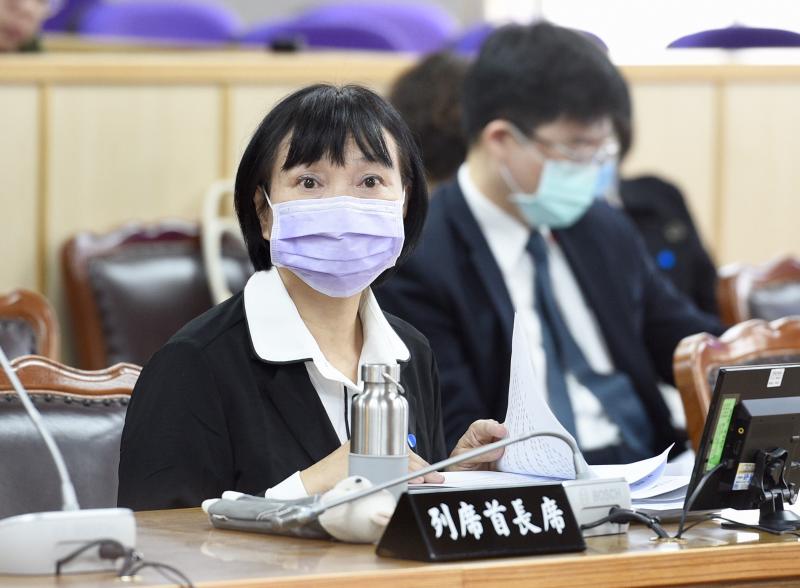A lawmaker yesterday called for progress on plans to transform the Chiang Kai-shek Memorial Hall into a public space, suggesting that it be converted into a “dictator history park” (獨裁者時代公園).
At a meeting of the legislature’s Judiciary and Organic Laws and Statutes Committee, Democratic Progressive Party Legislator Tsai Yi-yu (蔡易餘) said that the venue in Taipei could be converted into a “dictator history park” to educate the public and as reminder of Chiang Kai-shek’s (蔣介石) brutal autocratic rule in Taiwan, as his regime’s White Terror era spanned four decades.
“I call on the commission to adopt this change... there is nothing wrong with it. Everybody in the world knows that Chiang Kai-shek was a dictator,” he said.

Photo: Peter Lo, Taipei Times
Transitional Justice Commission Chairwoman Yang Tsui (楊翠) said that a cross-agency task force has been set up to deal with the matter and the commission would continue to discuss the matter with the Ministry of Culture.
Tabling the commission’s report on transitional justice within judicial agencies, she said that official documents have revealed that 70 percent of chief judges were card-carrying members of the Chinese Nationalist Party (KMT) during the Martial Law era.
Yang said the documents showed that prior to 1992, among the 119 chief judges who had served as Judicial Yuan president, or headed its Public Functionary Disciplinary Sanction Commission, “83 ... were confirmed KMT members.”
The information came from documents from the Judicial Yuan, and a requisite from Academia Historica on files from offices of head commissioners who headed up the Military Affairs Commission, which listed the chief judges’ curricula vitae and their party registration, she said.
The report also found that during the KMT’s rule, party officials abused their power to place party members in government ministries and agencies, and manipulated the justice system, Yang said.
A study is under way on KMT membership among the chief prosecutors and prosecutor-generals prior to 1992, or during the Martial Law era, she said, adding that the current report focused on past Judicial Yuan presidents and chief judges who headed up its Public Functionary Disciplinary Sanction Commission.
As an example of the KMT dictating judicial agencies’ policies, she said that the files contained an official letter sent from the KMT Central Committee, giving instructions to then-Judicial Yuan president Hsieh Kuan-sheng (謝冠生).
“The letter was addressed to ‘Party Comrade’ Hsieh Kuan-sheng, Convenor of Political Affairs Unit at Judicial Yuan. It was not addressed to Hsieh as Judicial Yuan president. This is clear evidence that Chiang ... as the nation’s president and the KMT’s leader was giving orders, and that Hsieh received ... instructions as a KMT member,” Yang said.

A decision to describe a Chinese Ministry of Foreign Affairs statement on Singapore’s Taiwan policy as “erroneous” was made because the city-state has its own “one China policy” and has not followed Beijing’s “one China principle,” Deputy Minister of Foreign Affairs Tien Chung-kwang (田中光) said yesterday. It has been a longstanding practice for the People’s Republic of China (PRC) to speak on other countries’ behalf concerning Taiwan, Tien said. The latest example was a statement issued by the PRC after a meeting between Singaporean Prime Minister Lawrence Wong (黃循財) and Chinese President Xi Jinping (習近平) on the sidelines of the APEC summit

Taiwan’s passport ranked 34th in the world, with access to 141 visa-free destinations, according to the latest update to the Henley Passport Index released today. The index put together by Henley & Partners ranks 199 passports globally based on the number of destinations holders can access without a visa out of 227, and is updated monthly. The 141 visa-free destinations for Taiwanese passport holders are a slight decrease from last year, when holders had access to 145 destinations. Botswana and Columbia are among the countries that have recently ended visa-free status for Taiwanese after “bowing to pressure from the Chinese government,” the Ministry

HEALTHCARE: Following a 2022 Constitutional Court ruling, Taiwanese traveling overseas for six months would no longer be able to suspend their insurance Measures allowing people to suspend National Health Insurance (NHI) services if they plan to leave the country for six months would be abolished starting Dec. 23, NHIA Director-General Shih Chung-liang (石崇良) said yesterday. The decision followed the Constitutional Court’s ruling in 2022 that the regulation was unconstitutional and that it would invalidate the regulation automatically unless the NHIA amended it to conform with the Constitution. The agency would amend the regulations to remove the articles and sections that allow the suspension of NHI services, and also introduce provisional clauses for those who suspended their NHI services before Dec. 23, Shih said. According to

Minister of Labor Ho Pei-shan (何佩珊) yesterday apologized after the suicide of a civil servant earlier this month and announced that a supervisor accused of workplace bullying would be demoted. On Nov. 4, a 39-year-old information analyst at the Workforce Development Agency’s (WDA) northern branch, which covers greater Taipei and Keelung, as well as Yilan, Lienchiang and Kinmen counties, was found dead in their office. WDA northern branch director Hsieh Yi-jung (謝宜容), who has been accused of involvement in workplace bullying, would be demoted to a nonsupervisory position, Ho told a news conference in Taipei. WDA Director-General Tsai Meng-liang (蔡孟良) said he would